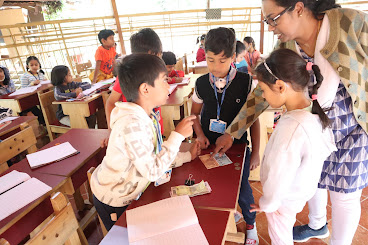Three Fundamental Principles of Education
Three Fundamental principles
of education
- Dr. Ajit Sabnis
“Empowering the young minds to become
socially responsible global citizens is our Goal.”
Till
now, we have seen as to how teachers, parents play an important role as primary
stakeholders in the process of education. We also talked about the Role model
conflict arising in a child due to constant exposure to different surroundings and
five basic elements of education juxtaposing them along with five gross elements
of the nature. In the last two postings, I have shared about eight types of
intelligence through which a child can be understood and pedagogy strategized. Three types of learners, three types of temperaments
and three types of natures have also been illustrated.
Today let me share about three fundamental principles of education
thru which a child’s imagination can be taken beyond the horizons present rote
method of learning.
Each Child is a soul in evolution and
the true knowledge lies deep within. True teaching is based on three
fundamental principles as observed by Sri Aurobindo.
1st
principle: Nothing Can Be Taught
 A Mango seed cannot grow into an Orange
tree irrespective of the manner in which the seed is nurtured. The knowledge
that the seed should grow as a mango tree is already encrypted in the seed.
Same thing happens in case of a child. The knowledge is already dormant. Acquiring
true knowledge is different from developing intellectual capabilities after the
mind is developed. This automatically happens as the child grows and mind
develops. What we are talking is about the initial stages of development and
growth.
A Mango seed cannot grow into an Orange
tree irrespective of the manner in which the seed is nurtured. The knowledge
that the seed should grow as a mango tree is already encrypted in the seed.
Same thing happens in case of a child. The knowledge is already dormant. Acquiring
true knowledge is different from developing intellectual capabilities after the
mind is developed. This automatically happens as the child grows and mind
develops. What we are talking is about the initial stages of development and
growth.
Here, the teacher is not an instructor or task master; he is a helper and
guide. He is to suggest and not impose. He does not impart knowledge, but shows
him how to acquire the knowledge by
himself.
Curiosity in a child is the gift of nature.
Never suppress child’s curiosity. Encourage questions and answer them or direct
them to find answers. We cannot expect the child to do exactly what we do. Please
remember, for a child, teacher is always a role model. A teacher, a parent,
should try inducing values in education through realistic and observable stories.
2nd
Principle: The Mind must be consulted in
its growth
The idea of hammering the child into the shape as
desired by the parent or the teacher is a barbarous and ignorant superstition.
The child should expand in accordance with his or her own nature. Sri Aurobindo
states: “To force the nature to abandon its own dharma is to do it permanent
harm, mutilate its growth and deface its perfection. It is a selfish tyranny
over a human soul and a wound to the nation which loses the benefit of the best
that a man could have given it and is forced to accept instead something
imperfect and artificial, second rate, perfunctory and common”
If the mind has to be
consulted in its growth, then the teacher has to observe the children in respect
of Temperament, Learning Ability and Child’s own nature. (we have already talked
about these things in the last blog)
3rd Principle: From near to the far, from that which is to
that which shall be
While teaching a child, child should be told about the unknown using the known knowledge that the child is acquainted with. Do not try explaining abstract things to a child without relating the abstract thru a known aspect.
Sri Aurobindo states, “The basis of a man’s nature is almost always, in addition to his soul’s
past, his heredity, his surroundings, his nationality, his country, the soil
from which he draws sustenance, the air which he breathes, the sights, sounds,
habits to which he is accustomed. They mould him not the less powerfully
because insensibly, and from that then we must begin”.
Genuine development is to take place “
c u ALL after 25th.Till then, have a great time.
.......................................................





Comments
Post a Comment